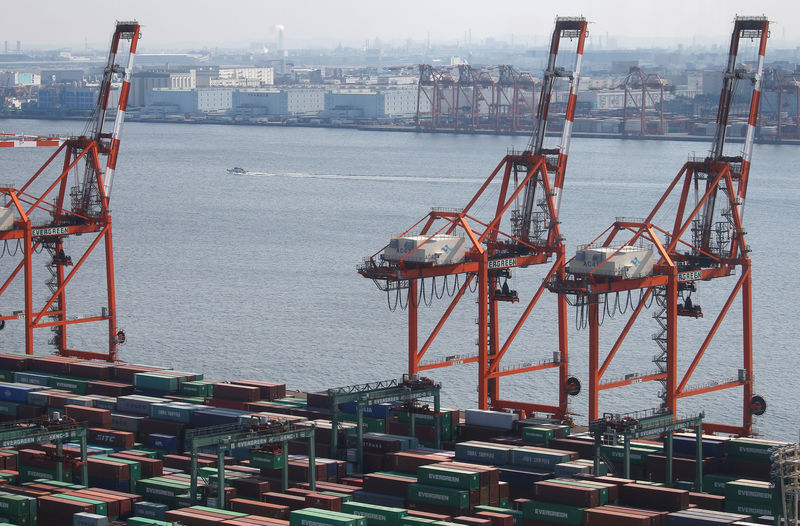 © Reuters. Shipping containers are seen at a port in Tokyo
© Reuters. Shipping containers are seen at a port in TokyoBy Tetsushi Kajimoto
TOKYO (Reuters) – Half of Japanese companies expect new trade talks with Washington to boost their U.S.-bound exports, a Reuters poll found, despite President Donald Trump’s intensifying drive to cut the trade gap between the two major economies.
There are, however, concerns among more than half of the respondents that the talks, which Japan and the United States agreed to in September, will lead to higher U.S. tariffs and other restrictions on Japanese exports, the monthly poll showed.
Since taking office nearly two years ago, Trump has repeatedly blasted trading partners Japan and China for running big trade surpluses with his country.
After the U.S. midterm elections this week, Trump said trade was one area in which he hoped to work with Democrats, who won control of the House of Representatives. Trump also criticized Japan for not treating the United States fairly on trade.
“They send in millions of cars at a very low tax. They don’t take our cars,” he said Wednesday.
U.S. Trade Representative Robert Lighthizer has called for greater access for American beef and rice and targeted what he calls non-tariff barriers to the Japanese car market.
Despite the trade hostility, Japanese companies seem confident that Tokyo will resist U.S. pressure, the Oct. 24-Nov. 5 survey showed.
“Japan must firmly resist unfair demands from the U.S.,” a manager of an electric machinery maker wrote.
“We hope the trade talks will result in a way that serves the best interests of Japan,” wrote a manager of a transport equipment maker.
When asked to pick the expected outcome from the trade talks, 50 percent of companies polled chose “an expansion of exports.” Just 19 percent believe Japan will open up its domestic farm market, where products like rice and beef are protected by high tariffs, or remove supposed barriers to the car market, the survey showed.
Japanese authorities argue the country’s car market faces no barriers and that U.S. companies have done poorly in Japan because they haven’t invested in the market.
Asked about their biggest concern regarding the talks, 53 percent said they feared the United States would impose import restrictions or higher tariffs on Japanese products.
Twenty-two percent said they worry about the adoption of currency provisions in any trade pact and how that could impact monetary policy. Underlying such concerns are fears that Washington might link trade with foreign exchange policy and monetary easing and accuse Japan of keeping the yen artificially weak.
In January 2017, Trump alleged that Japan used its “money supply” to weaken the yen and give exporters an unfair trade advantage. Such criticism could create currency diplomacy problems for Tokyo if it responds to a spike in the yen with a devaluation.
“We’re watching what the two countries may settle for if currency provisions are introduced, and how that would affect the currency and stock markets,” a manager of a manufacturer wrote.
Companies responded anonymously to the survey, conducted for Reuters by Research. It polled 482 large and mid-sized non-financial firms, about 240 of which responded to the questions about trade.
U.S.-CHINA FRICTION
Japanese businesses are pessimistic about the outlook for the U.S.-Sino trade war, which they worry will indirectly hurt export-reliant Japan, the survey showed.
Japan’s role in the global supply chain makes it vulnerable to a decline in Chinese exports to the United States. Chinese manufacturers use parts and equipment from Japan, and Japanese companies also have factories in China that export to America.
Already, the U.S.-China trade friction is prompting companies such as Yaskawa Electric Corp (T:), Fanuc Corp (T:) and Canon Inc (T:) to issue conservative earnings forecasts, reflecting their customers’ cautious stance on capital expenditure plans.
Washington and Beijing have imposed tit-for-tat duties on each other’s goods over recent months, with neither side backing down from an increasingly bitter trade dispute that has jolted financial markets and cast a pall over the global economy.
In the survey, about three quarters of Japanese firms expect the U.S.-China trade war to last until end-2019 or beyond, with a majority anticipating the trade dispute to become worse over the next one to two years.
“The impact won’t be limited to the two countries,” a manager of a construction company wrote in the survey. “They must become conscious as world leaders and mend their ways by taking account of harmful effects from prioritizing their own country.”
Source: Investing.com




























